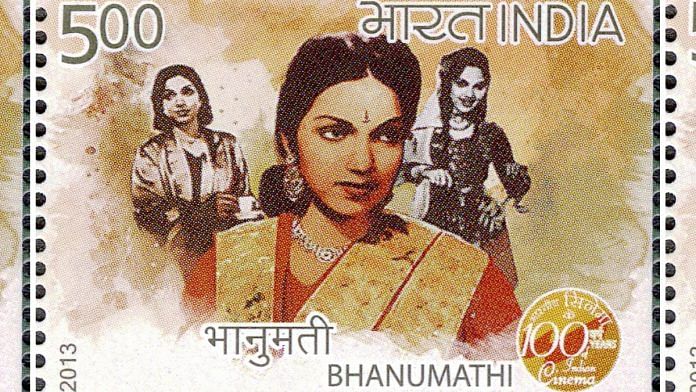Often considered the first female superstar of Telugu cinema and the South Indian film industry, P. Bhanumathi Ramakrishna was a multifaceted actor, music composer, director, singer and writer, who was also known for her philanthropy. She was called ‘Ashtavadani,’ one who can perform eight tasks simultaneously.
She acted in more than a hundred Tamil and Telugu films, from her debut in Vara Vikrankatam (1939) at the age of 13 to her last film Pelli Kanuka in 1998.
She lent her voice to many songs, and composed the music for five films. She also wrote screenplays, directed and produced movies under her company, Bharani Films.
The ideal choice
Music and performances were was an important part of Bhanumathi Ramakrishna’s life from a young age. Born in Andhra Pradesh on 7 September 1925 to Saraswatamma and Bommaraju Venkata Subbaiah, the third child in a middle-class family, she grew up training in classical music and watching her father perform at many stage shows.
In her debut role in Vara Vikrayam directed by C. Pullayya, she played a teenager who is forced to marry an old man. The character dies by suicide in the end. The film’s director was looking for an actress who could sing, and a young Bhanumathi Ramakrishna emerged as the ideal choice. Her prowess as a singer got her lead roles in films such as Malathi Madhavam (1940) and Dharma Patni (1941).
By the age of 18, Bhanumathi had already established herself as an actor. It was on the set of her fifth film, Krishna Prema (1943) that she met her future husband, assistant director P. S. Ramakrishna Rao. She proposed to Rao and married him the same year, despite her father’s objections. They later named their production house, Bharani Pictures, after their son.
With the launch of their production house in 1947, the husband-wife duo produced 15 movies in total, including super hit movies such as Laila Majnu (1949) and the National Award winning Vipranarayana (1954). Bhanumathi then began exploring other roles behind the camera, from direction to writing.
She had decided to retire from acting after her marriage but it was director B.N Reddy who persuaded her against it. The actor returned with the 1943 film, Swarga Seema, a loose adaptation of Irish playwright George Bernard Shaw’s Pygmalion.
The film was a success, in India and abroad, and it cemented Bhanumathi’s status among the cinema icons.
One of the things that set Bhanumathi apart from her peers in the industry at the time was her diverse choice of roles in films. She wasn’t just the romantic, fun loving woman on screen. She also played the woman who could manipulate and the one who engaged in adultery. No matter what character Bhanumathi essayed, her strong individuality and sense of humour remained intact.
Chakrapani, a famous Telugu director said in an interview, “An audience will not watch Bhanumathi cry, they would rather watch if she makes others cry.”
When Bhanumathi entered the Tamil film industry, she was commanding as much as Rs 25,000 per film. It was roughly half of the production cost at the time. One of her most well-known roles was in the 1951 musical hit and Telugu classic, Malliswari, wherein she starred opposite Nandamuri Taraka Rama Rao, or NTR, who went on to become Chief Minister of Andhra Pradesh.
Also read: Ali Sardar Jafri–the Urdu poet wrote anti-war poems, opposed the rise of communalism in India
Singer, actor, novelist but not a dancer
Bhanumathi led the way for other actresses in the South Indian film industry. She was not only the first woman to have owned a film studio and but also the first female actor to have a dual role in the film Chandirani (1953), which she directed. It was shot in three languages—Telugu, Tamil and Hindi—simultaneously.
Her star power overshadowed her work as a novelist. As a writer, Bhanumathi won Andhra Pradesh Sahitya Academy’s Best Short Story Writer award for Attagari Kathalu (Mother-in-law’ stories) as well as the National Award for best writer in 1994 for her autobiographical work, Nalo Nenu.
Among her many talents, Bhanumathi was most known for her command over music. Former Tamil Nadu Chief Minister C.N. Annadurai called her the ‘actress who is a dictionary of performance.’
She learnt horse riding and sword fighting with ease but there was one thing she never mastered—dance. It was not her strongest suit. Bhanumathi’s dancing was often ridiculed by the media in the early years of her career and notable choreographer Vempati Pedda Satyam, her dance teacher, would often get irritated by the actress’ lack of grace.
Also read: Debaki Bose—the tough taskmaster who took Indian films to international heights
Padma Bhushan and philanthropy
Bhanumathi Ramakrishna had appeal across masses from the common man to the first Indian Vice-President Sarvepalli Radhakrishnan and former Prime Minister Indira Gandhi. She was conferred the Padma Shri in 1966 and Padma Bhushan in 2003 for her contribution to Indian cinema.
Later in her life, Bhanumathi bent toward philanthropic work. She joined Altrusa International Inc., Chicago as the founding member and treasurer of its Madras branch. She was also a life member of the Red Cross Society and established the Dr Bhanumathi Ramakrishna Matriculation School in Chennai.
Bhanumati died on 24 December 2005 in Chennai at the age of 80, following a brief illness.
(Edited by Ratan Priya)



